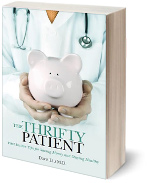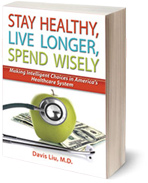The Limits of Consumer Driven Health Care – A Trip to the Car Mechanic
 As a practicing primary care doctor, I very much believe that better care is when patients are engaged and share decision making with their doctor. Though in the past doctors treated patients in a paternalistic manner, my generation of doctors has been taught to uphold a balanced doctor-patient relationship and partnership. This change in balance of power has accelerated with the ease and availability of information via the internet. More patients not only are asking about diagnoses and treatments, but correctly self-diagnosing. They merely come by to check in with me to make sure they got it right and to clarify the treatment options.
As a practicing primary care doctor, I very much believe that better care is when patients are engaged and share decision making with their doctor. Though in the past doctors treated patients in a paternalistic manner, my generation of doctors has been taught to uphold a balanced doctor-patient relationship and partnership. This change in balance of power has accelerated with the ease and availability of information via the internet. More patients not only are asking about diagnoses and treatments, but correctly self-diagnosing. They merely come by to check in with me to make sure they got it right and to clarify the treatment options.
Overall, this is better patient care.
However, over the past few years a trend has gotten more momentum. As health care becomes increasingly unaffordable, many believe quality and costs would improve if we treated health care like other markets where consumers drive health care. If only patients were even more engaged in researching medical tests, procedures, providers, and pricing, like they do when buying a television or car would health care be affordable.
If only that were true.
There are limits to this trend. Though everything I diagnose and evaluate can be researched online, there is a difference between knowledge and wisdom. Even understanding costs with price transparency does not mean people will act differently. It is possible that consumer driven health care will fail to live up to its expectations? These two facts alone make the claims of consumer driven health care dubious.
Will Consumer Driven Health Care Solve Affordability?
As an example, I a reminded of my recent visit to my car dealer. Minutes before driving to an important meeting, my 16 year old BMW failed to start. All the dashboard indicators and dials flashed wildly. My guess was that the battery died. It was fine just 4 hours ago.
I called AAA. They jumped the battery. The engine roared to life again. Since it was only good until I turned off the engine, I immediately drove to my car dealership, without an appointment, to get a new battery. It turns out that AAA battery service does not carry the battery needed to fix the problem.
Now I know this car dealership very well. My car has been under their care for about a decade. Every time the Service Required indicator comes on is when I see them. Each maintenance service is dutifully recorded in their electronic system. As far as I knew I was up to date on everything.
Since they were going to change the battery, would they also mind fixing the fog light? It had been broken for a while, but I hadn’t bothered to deal with it. My wife, however, discovered it was broken recently and insisted I ask them to address the problem. If it was up to me, I would have left it alone.
So far, so good. This story isn’t much different than a patient suffering from an unexpected acute injury, which needs immediate medical attention. He sees his doctor the same day. Patient hasn’t needed care for a while. Since he is now at the doctor’s office, there was this other issue that has been a problem for a while; might the doctor evaluate it too?
My car dealer service advisor returns. The battery and the fog light are not available until the next day. It will take him at least until tomorrow before the car can be returned. Here was the price. Evidentially, BMW batteries are not cheap. It isn’t like I could go compare battery prices and drive around town to get it installed. I would have to jump start the car each time to make it happen.
Getting a New Car Battery Was Fine. What About 3 mm Brake Pads?
As I give the verbal consent to being the process, my service advisor also tells me that there were two other issues. As the mechanic was evaluating my car, he noticed that hose that contains steering wheel fluid was leaking. It was not clear how long that was occurring. Also, since they noticed I was due for a tire rotation and brake inspection, he did that as well. The rear brake pads were just 3 mm and would need replacement. What did I want to do?
Now, what am I supposed to do? I could ask how much it would cost, but the cost must be relative to what? Is it based on how likely I felt going without repair would or would not be risky? It is based on how much money I had available in my bank account? It is based on my belief that my car dealer is trying to get more money out of me? Is it possible other auto repair shops might have better prices? Though I could shop around, I wouldn’t know what to make of a higher or lower price. Is a lower price better than a higher one? How am I supposed to tell the difference? How do I judge quality? I’m not a mechanic. I don’t have a friend who is a mechanic.
Increasingly, patients are asked to shop around for MRI tests, negotiate with doctors for tests or procedures because they are responsible more in sharing costs. Can they judge quality or value? Is it possible the more expensive option actually has more value?
After judging the value of cost and trying to determine if I’m getting a “fair” price, I now need to prioritize which repair to do. It’s not like I planned for the car battery to die. That needs to be addressed. Perhaps I could skip the foglight repair and face the wrath of my wife. I certainly didn’t know about the steering hose leak. Steering seems ok. What would happen if the leak got bigger? Would I simply need to pull on the steering wheel harder? The brakes? The car stops fine. Are the 3 mm brake pad lining thickness really a problem? What if I waited on those? How much longer can I wait? What does 3 mm mean in the grand scheme of things? It’s better than 2 mm but is it 50 percent better? No wonder patients feel uncomfortable interpreting a hemoglobin (measure of red cells) count. What does 9 mean when the normal is 12.5 and is that a little worse or a lot worse than 11 versus 7?
He shows me the prices of the repairs. He tells me it will take an additional day on top of the day already spent to order the battery.
I’m a doctor. Not a mechanic. Replace the brake pads or wait?
So I ask the service advisor, what should I to do?
It’s your choice. I would recommend you address them as soon as possible.
Ah… shared decision making.
Now, I suppose I could go home after the battery repair and research what is considered the appropriate brake pad thickness for a 1997 BMW 328i 4 door coupe. I could have him walk me to the car and so me the extent of the leak in the steering hose. I could even shop around various auto shops and ask them what they thought. Perhaps I didn’t need any of these repairs. After all, isn’t this the behavior that consumers are supposed to display? I shouldn’t take what my mechanic says as gospel. He could be wrong and selling me parts and services, which are unnecessary. Even if the repairs were needed, I might even find a better price even though I would no idea how to judge which mechanic performed better or worse than my car dealer’s mechanic. I’ve already been with the car dealer for many years. They do sell BMWs so surely they know what they are doing.
So what would you do?
Do you take MasterCard?
There is some evidence already that the costs savings touted by consumer driven health care are not occurring. Recent articles noted that “increasing healthcare cost sharing does little to reduce overall healthcare costs or make it more efficient” and that patients more involved in their medical care, “may also wind up with longer hospital stays and higher bills than their peers who leave the decision making up to their doctors.” For health care to be better quality, more accessible, and more affordable we should welcome all new ideas but also realize the limitations of them.
After all, if health care’s problems were so easy to solve, wouldn’t they have been solved already?
 Get important exclusive advice and tips on how to save money while staying healthy.
Get important exclusive advice and tips on how to save money while staying healthy. Learn how to make intelligent choices in America's Healthcare System.
Learn how to make intelligent choices in America's Healthcare System.